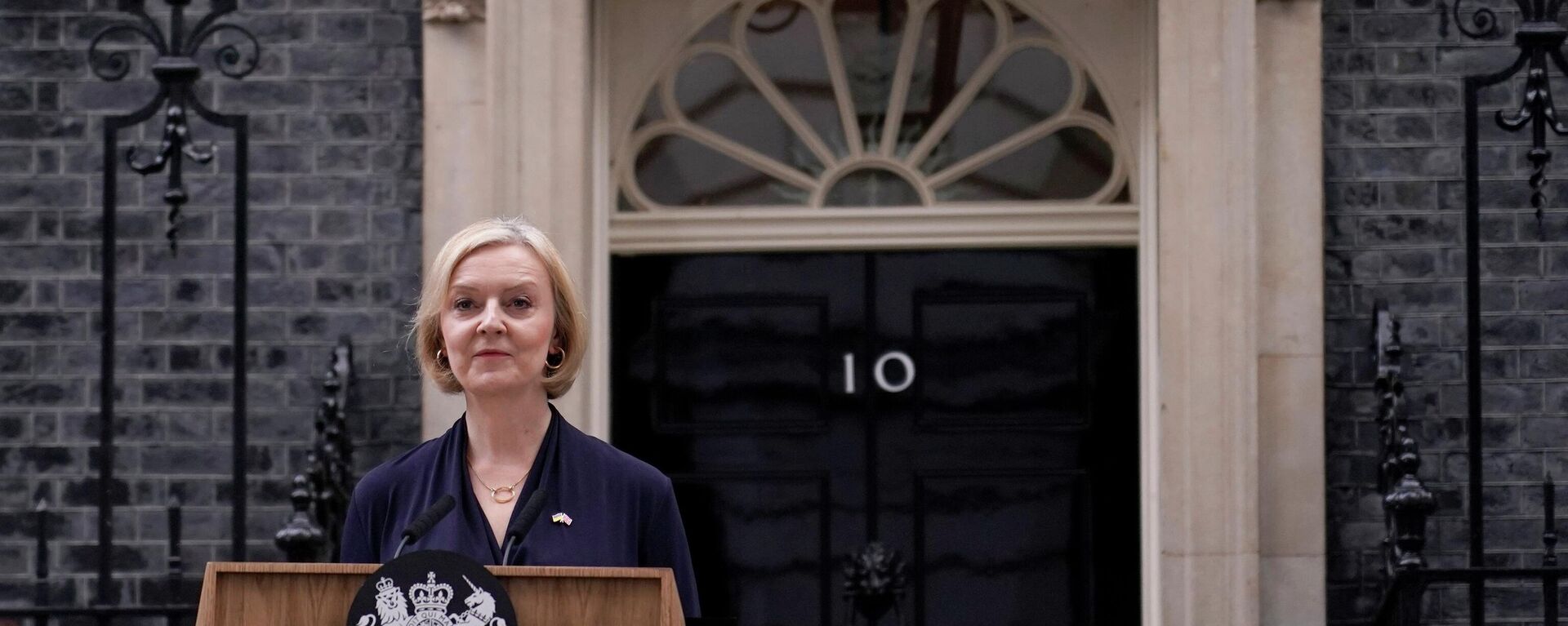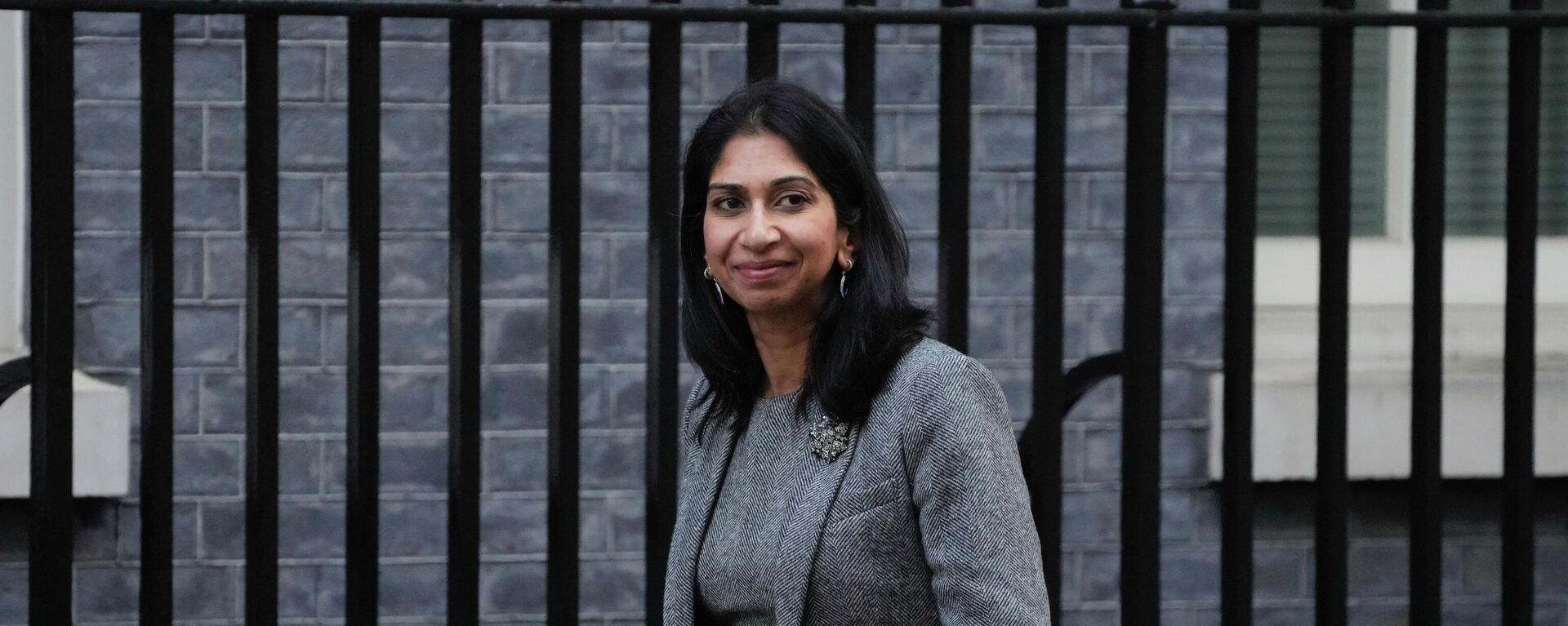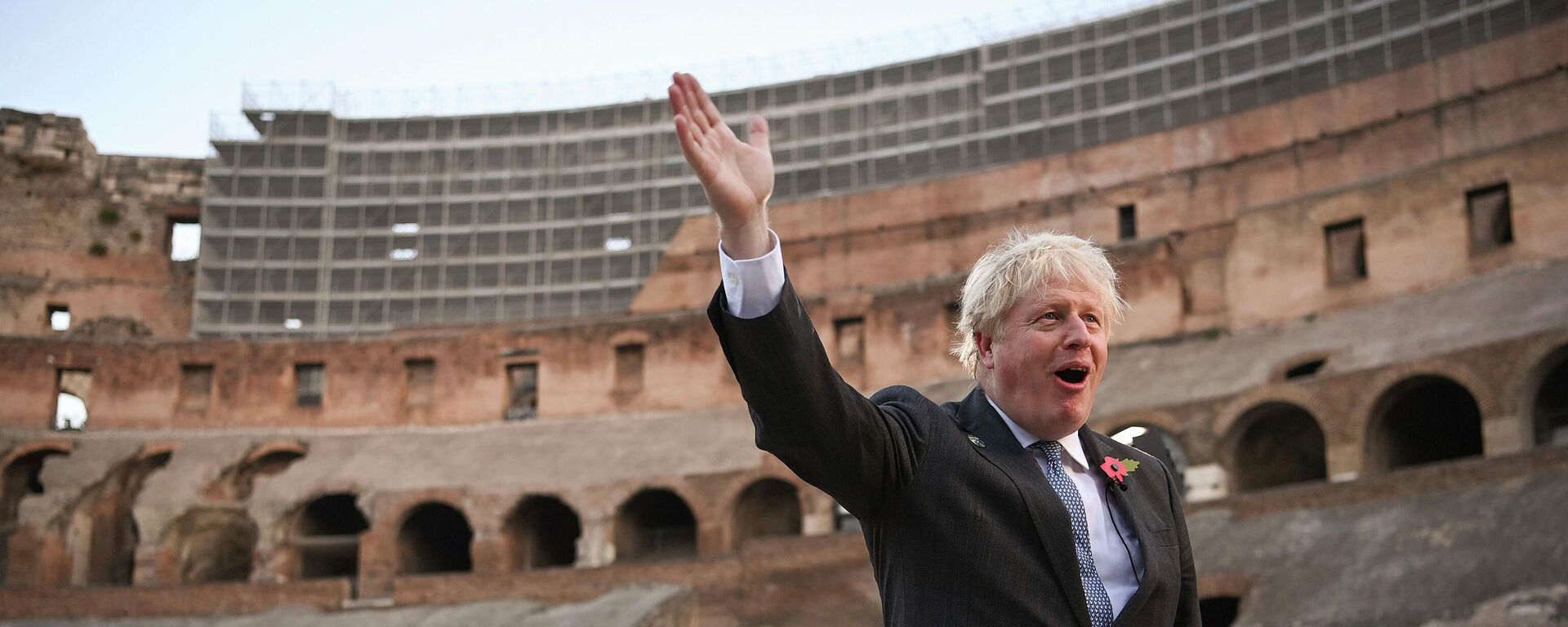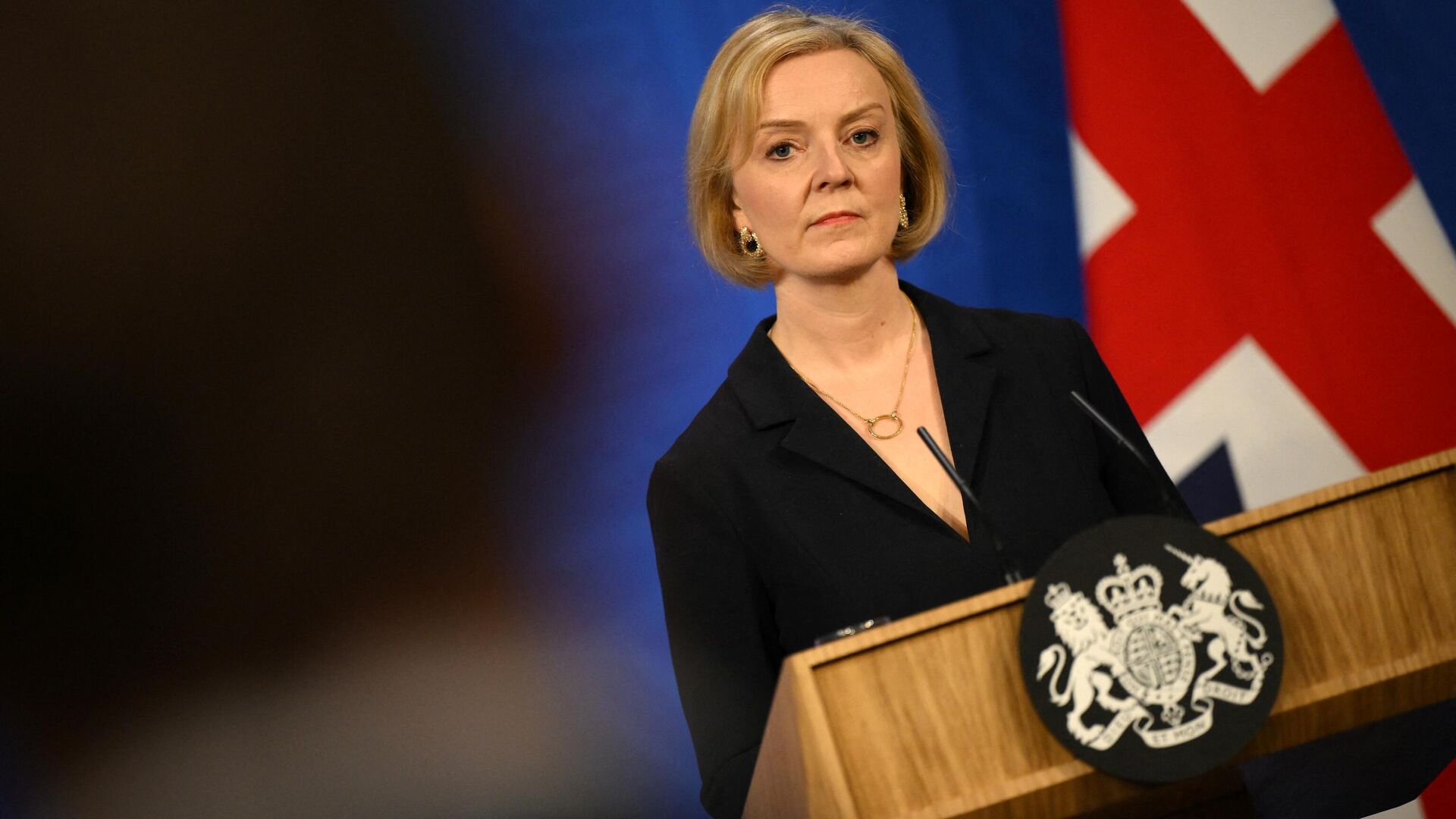https://sputnikglobe.com/20221020/as-liz-truss-quits-who-are-the-shortest-ruling-british-prime-ministers-1102465152.html
As Liz Truss Quits, Who Are the Shortest-Ruling British Prime Ministers?
As Liz Truss Quits, Who Are the Shortest-Ruling British Prime Ministers?
Sputnik International
It took longer for the Tory party to elect Liz Truss as leader and new PM in the summer contest that ran from July 7 to September 5 than it did to get rid of... 20.10.2022, Sputnik International
2022-10-20T18:20+0000
2022-10-20T18:20+0000
2023-05-28T15:24+0000
world
liz truss
boris johnson
united kingdom (uk)
https://cdn1.img.sputnikglobe.com/img/07e6/0a/13/1102062806_0:160:3073:1888_1920x0_80_0_0_e554c02803c6ee612e5437e297bd0bc3.jpg
The resignation of Liz Truss just six weeks into her tenure has made her officially the shortest-serving prime minister in British history.But which other past PMs did Truss beat to win that dubious accolade?Canning and GoderichGeorge Canning only managed 119 days in power between April and August 1827 — but to be fair to him, his government was cut short by his own death.King George IV reluctantly appointed Canning, a moderate Tory, as PM after his predecessor and closest ally Robert Jenkinson, 2nd Earl of Liverpool, stepped down after 15 years in office after suffering a stroke. Canning was also in such ill health that he had been close to death after attending the night-time funeral of the king's brother Frederick that January.Canning's greatest legacy was his policy of supporting the independence of former Spanish and Portuguese colonies in the Americas — and therefore the interests of British merchants — which lived on for years after his death.Frederick Robinson, the 1st Viscount Goderich, was appointed Canning's successor, but did not last much longer. The good-natured PM struggled to balance the conflicting demands of the king and his coalition of moderate Tories and Whigs — ancestors of the Liberal Democrats — and was also preoccupied with his wife's mental illness.Goderich had already penned his resignation letter when he was called for an audience with the King, who dismissed him and appointed the famous general the Duke of Wellington in his place. The outgoing PM is said to have wept during their meeting, but within days he had become "quite another man [who] sleeps at nights now, and laughs and talks as usual."Bonar LawA century after Canning's short-lived premiership, the amusingly-named Andrew Bonar Law gained the distinction of being the only Canadian-born British PM, as well as the fourth shortest-serving.Like Truss, Law's government was preoccupied with the problems of the recent partition of Ireland following the independence war.Despite lacking cabinet-ministerial experience, Law was elected leader of the Conservative Party as a compromise candidate and then led them to victory in the October 1922 election, ending the coalition government of Liberal David Lloyd George.But like Canning, Law was also unwell. He stepped down in May 1923 after being diagnosed with terminal throat cancer which left him unable to speak in parliament.The Last Aristocratic Prime MinisterThe list of short-term PMs is dominated by aristocratic politicians of the 18th and 19th centuries, when party politics was in its infancy and the monarchy exerted more influence over government. But another lord of the manor came to rule the country in the swinging sixties.Sir Alec Douglas-Home gave up his earldom to govern the UK for just a year and a day. An old-fashioned Scottish aristocrat who had played cricket at club level, he already looked like an anachronism when he took up residence in Downing Street in 1963.Douglas-Home was appointed after his predecessor, fellow-Tory and Scot Harold Macmillan, stood down for health reasons that ultimately proved less serious than feared. Douglas-Home’s short time as leader was relatively uneventful at home.When it came to foreign policy, he supported US President John F. Kennedy — with whom he had a good personal relationship — during the Cuban missile crisis. Following Kennedy's assassination in 1963, the Scot was not so lucky with his successor Lyndon B. Johnson. The two fell out over Douglas-Home's continuation of Macmillan's refusal to join Washington's trade embargo on Cuba.Douglas-Home's conservatives lost the 1964 general election to the Labour Party under the leadership of Harold Wilson, who went on to win three more elections.Perhaps the most famous incident of Douglas-Home's premiership was the evening when two left-wing students from Aberdeen knocked on the door of a house where he was staying with the intention of kidnapping him. "I suppose you realize if you do, the Conservatives will win the election by 200 or 300," he purportedly argued, before pouring glasses of beer for the would-be abductors. They soon abandoned their plot.The Terrible 2000sThe last British Prime minister to govern for a whole decade was Tony Blair, who first came to power in 1997. But the young leader's glamor gradually wore off as he got the UK into one US-led war after another. In June 2007 his Labour Party had decided Blair was more of a liability than an asset and forced him to finally honor his gentleman's agreement to make way for his chancellor, Gordon Brown.Like his Labour predecessor Jim Callaghan, Brown marched his political career up the proverbial hill by strongly hinting at a snap general election that autumn — just to secure support at that September's round of party and trade union conferences.The Credit Crunch financial crisis was already beginning to unravel with the collapse of mortgage lender Northern Rock, but Brown denied that there was a systemic problem. When the full banking crash hit the following summer and autumn it was too late for Brown to go to the polls. His government began implementing austerity measures to pay for a bail-out of several major banks, forever tarnishing his reputation as the "no return to boom and bust" leader. A hung parliament in the 2010 election saw new Tory leader David Cameron take office at the head of a rare coalition government with the Lib Dems. Brown had served just two years and 318 days as PM.Cameron consolidated his hold on power with an outright victory in the 2015 election, only to resign in a huge sulk after the electorate voted to leave the European Union against his wishes the following year. That ushered in a period of political instability that has lasted until today.Cameron's successor Theresa May was a compromise candidate, who ultimately pleased nobody but kept the ambitious Boris Johnson out of Downing Street for three years.May's bid to win a popular mandate by calling a snap general election in 2017 almost saw left-wing Labour leader Jeremy Corbyn win power, and left her dependent on the Democratic Unionist Party in Northern Ireland for a legislative majority.Her attempts to negotiate the softest Brexit possible by capitulating to Brussels' demands resulted in the humiliation of the Tories coming fifth in the last ever UK elections to the European Parliament in May 2019, at which point the "men in grey suits" forced her to tearfully announce her resignation after just three years and 11 days.BoJo finally had his day when he defeated his Europhile opponents to clinch the Tory leadership in July 2019. He was almost immediately faced with a rebellion by backbench remainers who sided with the opposition in a bid to force the people to vote again on leaving the EU.Months of anarchy in Parliament, with no governing majority and speaker John Bercow ripping up centuries of procedure, were finally broken when Johnson wooed enough Labour MPs to support his withdrawal agreement that the opposition backed another snap election that December.Johnson's almost obsessive repetition of his "get Brexit done" slogan won a Conservative landslide victory with 365 of 650 seats. But the very next month the COVID-19 pandemic reached British shores.While Johnson was able to claim some coups during the outbreak, including rolling out the first mass vaccination programme in a major nation and lifting lockdown measures earlier than the UK's neighbors, it ultimately blighted his government after stories of Downing Street staff partying in their offices when pubs and schools were closed were splashed across the media.The last straw for the famed 'BoJo Mojo' came this summer when his recently-deputy chief whip Chris Pincher resigned after drunkenly groping a fellow male Tory MP in a swanky West End private members' club.Johnson tried to ride out the storm even as it emerged he had had known of Pincher's eponymous reputation, but finally quit after three years and 44 days in office following a mass wave of resignations from his government led by Chancellor Rishi Sunak — who is now hotly tipped to replace Truss.
https://sputnikglobe.com/20221020/uk-prime-minister-liz-truss-announces-resignation-1102460470.html
https://sputnikglobe.com/20221020/truss-government-denies-braverman-quit-over-migrant-policy-or-for-leadership-bid-1102446802.html
https://sputnikglobe.com/20221018/buyers-remorse-most-tories-want-truss-out-and-boris-back-1102012573.html
united kingdom (uk)
Sputnik International
feedback@sputniknews.com
+74956456601
MIA „Rossiya Segodnya“
2022
James Tweedie
https://cdn1.img.sputnikglobe.com/img/07e4/08/1c/1080307270_0:3:397:400_100x100_80_0_0_7777393b9b18802f2e3c5eaa9cbcc612.png
James Tweedie
https://cdn1.img.sputnikglobe.com/img/07e4/08/1c/1080307270_0:3:397:400_100x100_80_0_0_7777393b9b18802f2e3c5eaa9cbcc612.png
News
en_EN
Sputnik International
feedback@sputniknews.com
+74956456601
MIA „Rossiya Segodnya“
Sputnik International
feedback@sputniknews.com
+74956456601
MIA „Rossiya Segodnya“
James Tweedie
https://cdn1.img.sputnikglobe.com/img/07e4/08/1c/1080307270_0:3:397:400_100x100_80_0_0_7777393b9b18802f2e3c5eaa9cbcc612.png
liz truss, boris johnson, united kingdom (uk)
liz truss, boris johnson, united kingdom (uk)
As Liz Truss Quits, Who Are the Shortest-Ruling British Prime Ministers?
18:20 GMT 20.10.2022 (Updated: 15:24 GMT 28.05.2023) It took longer for the Tory party to elect Liz Truss as leader and new PM in the summer contest that ran from July 7 to September 5 than it did to get rid of her 44 days later.
The resignation of Liz Truss just six weeks into her tenure has made her officially the shortest-serving prime minister in British history.
But which other past PMs did Truss beat to win that dubious accolade?
George Canning only managed 119 days in power between April and August 1827 — but to be fair to him, his government was cut short by his own death.
King George IV reluctantly appointed Canning, a moderate Tory, as PM after his predecessor and closest ally Robert Jenkinson, 2nd Earl of Liverpool, stepped down after 15 years in office after suffering a stroke. Canning was also in such ill health that he had been close to death after attending the night-time funeral of the king's brother Frederick that January.
Canning's greatest legacy was his policy of supporting the independence of former Spanish and Portuguese colonies in the Americas — and therefore the interests of British merchants — which lived on for years after his death.
Frederick Robinson, the 1st Viscount Goderich, was appointed Canning's successor, but did not last much longer. The good-natured PM struggled to balance the conflicting demands of the king and his coalition of moderate Tories and Whigs — ancestors of the Liberal Democrats — and was also preoccupied with his wife's mental illness.
Goderich had already penned his resignation letter when he was called for an audience with the King, who dismissed him and appointed the famous general the Duke of Wellington in his place. The outgoing PM is said to have wept during their meeting, but within days he had become "quite another man [who] sleeps at nights now, and laughs and talks as usual."

20 October 2022, 12:34 GMT
A century after Canning's short-lived premiership, the amusingly-named Andrew Bonar Law gained the distinction of being the only Canadian-born British PM, as well as the fourth shortest-serving.
Like Truss, Law's government was preoccupied with the problems of the recent partition of Ireland following the independence war.
Despite lacking cabinet-ministerial experience, Law was elected leader of the Conservative Party as a compromise candidate and then led them to victory in the October 1922 election, ending the coalition government of Liberal David Lloyd George.
But like Canning, Law was also unwell. He stepped down in May 1923 after being diagnosed with terminal throat cancer which left him unable to speak in parliament.

20 October 2022, 12:25 GMT
The Last Aristocratic Prime Minister
The list of short-term PMs is dominated by aristocratic politicians of the 18th and 19th centuries, when party politics was in its infancy and the monarchy exerted more influence over government. But another lord of the manor came to rule the country in the swinging sixties.
Sir Alec Douglas-Home gave up his earldom to govern the UK for just a year and a day. An old-fashioned Scottish aristocrat who had played cricket at club level, he already looked like an anachronism when he took up residence in Downing Street in 1963.
Douglas-Home was appointed after his predecessor, fellow-Tory and Scot Harold Macmillan, stood down for health reasons that ultimately proved less serious than feared. Douglas-Home’s short time as leader was relatively uneventful at home.
When it came to foreign policy, he supported US President John F. Kennedy — with whom he had a good personal relationship — during the Cuban missile crisis. Following Kennedy's assassination in 1963, the Scot was not so lucky with his successor Lyndon B. Johnson. The two fell out over Douglas-Home's continuation of Macmillan's refusal to join Washington's trade embargo on Cuba.
Douglas-Home's conservatives lost the 1964 general election to the Labour Party under the leadership of Harold Wilson, who went on to win three more elections.
Perhaps the most famous incident of Douglas-Home's premiership was the evening when two left-wing students from Aberdeen knocked on the door of a house where he was staying with the intention of kidnapping him. "I suppose you realize if you do, the Conservatives will win the election by 200 or 300," he purportedly argued, before pouring glasses of beer for the would-be abductors. They soon abandoned their plot.

18 October 2022, 16:20 GMT
The last British Prime minister to govern for a whole decade was
Tony Blair, who first came to power in 1997. But the young leader's glamor gradually wore off as he got the UK into one US-led war after another. In June 2007 his Labour Party had decided Blair was more of a liability than an asset and forced him to finally honor his gentleman's agreement to make way for his chancellor,
Gordon Brown.
Like his Labour predecessor Jim Callaghan, Brown marched his political career up the proverbial hill by strongly hinting at a snap general election that autumn — just to secure support at that September's round of party and trade union conferences.
The Credit Crunch financial crisis was already beginning to unravel with the collapse of mortgage lender Northern Rock, but Brown denied that there was a systemic problem. When the full banking crash hit the following summer and autumn it was too late for Brown to go to the polls. His government began implementing austerity measures to pay for a bail-out of several major banks, forever tarnishing his reputation as the "no return to boom and bust" leader. A hung parliament in the 2010 election saw new Tory leader
David Cameron take office at the head of a rare coalition government with the Lib Dems. Brown had served just two years and 318 days as PM.
Cameron consolidated his hold on power with an outright victory in the 2015 election, only to resign in a huge sulk after the electorate voted to leave the European Union against his wishes the following year. That ushered in a period of political instability that has lasted until today.
Cameron's successor
Theresa May was a compromise candidate, who ultimately pleased nobody but kept the ambitious Boris Johnson out of Downing Street for three years.
May's bid to win a popular mandate by calling a snap general election in 2017 almost saw left-wing Labour leader
Jeremy Corbyn win power, and left her dependent on the Democratic Unionist Party in Northern Ireland for a legislative majority.
Her attempts to negotiate the softest Brexit possible by capitulating to Brussels' demands resulted in the humiliation of the Tories coming fifth in the last ever UK elections to the European Parliament in May 2019, at which point the "men in grey suits" forced her to tearfully announce her resignation after just three years and 11 days.
BoJo finally had his day when he defeated his Europhile opponents to clinch the Tory leadership in July 2019. He was almost immediately faced with a rebellion by backbench remainers who sided with the opposition in a bid to force the people to vote again on leaving the EU.
Months of anarchy in Parliament, with no governing majority and speaker John Bercow ripping up centuries of procedure, were finally broken when Johnson wooed enough Labour MPs to support his withdrawal agreement that the opposition backed another snap election that December.
Johnson's almost obsessive repetition of his "get Brexit done" slogan won a Conservative landslide victory with 365 of 650 seats. But the very next month the COVID-19 pandemic reached British shores.
While Johnson was able to claim some coups during the outbreak, including rolling out the first mass vaccination programme in a major nation and lifting lockdown measures earlier than the UK's neighbors, it ultimately blighted his government after stories of Downing Street staff partying in their offices when pubs and schools were closed were splashed across the media.
The last straw for the famed 'BoJo Mojo' came this summer when his recently-deputy chief whip Chris Pincher resigned after drunkenly groping a fellow male Tory MP in a swanky West End private members' club.
Johnson tried to ride out the storm even as it emerged he had had known of Pincher's eponymous reputation, but finally quit after three years and 44 days in office following a mass wave of resignations from his government led by Chancellor Rishi Sunak — who is now hotly tipped to replace Truss.






